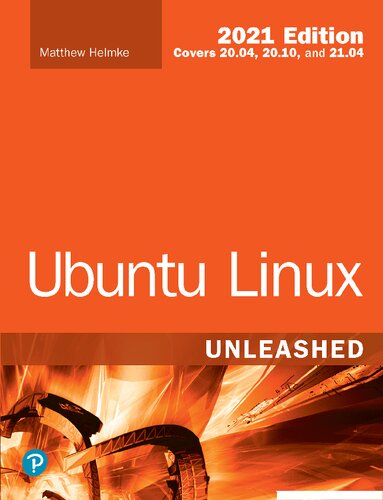

Most ebook files are in PDF format, so you can easily read them using various software such as Foxit Reader or directly on the Google Chrome browser.
Some ebook files are released by publishers in other formats such as .awz, .mobi, .epub, .fb2, etc. You may need to install specific software to read these formats on mobile/PC, such as Calibre.
Please read the tutorial at this link: https://ebookbell.com/faq
We offer FREE conversion to the popular formats you request; however, this may take some time. Therefore, right after payment, please email us, and we will try to provide the service as quickly as possible.
For some exceptional file formats or broken links (if any), please refrain from opening any disputes. Instead, email us first, and we will try to assist within a maximum of 6 hours.
EbookBell Team

4.1
40 reviewsUbuntu Linux Unleashed 2021 Edition is filled with unique and advanced information for everyone who wants to make the most of the Ubuntu Linux operating system. This new edition has been thoroughly updated by a long-time Ubuntu user and early community leader to reflect the exciting new Ubuntu 20.04 LTS release, with a forthcoming online update mid-2021, at the halfway mark before the next LTS release comes out.
Linux writer Matthew Helmke covers all you need to know about Ubuntu 20.04 LTS installation, configuration, productivity, command-line usage, development, systems administration, server operations, networking, virtualization, cloud computing, DevOps, and more―including intermediate-to-advanced techniques you won't find in any other book.
Helmke presents up-to-the-minute introductions to Ubuntu's key productivity and web development tools, programming languages, hardware support, and more. You will find new or improved coverage of the Ubuntu desktop experience, common web servers and software stacks, an introduction to containers like Docker and Kubernetes, as well as a wealth of systems administration information that is stable and valuable over many years.
Configure and use the Ubuntu desktop
Get started with multimedia and productivity applications
Manage Linux services, users, and software packages
Administer and run Ubuntu from the command line
Automate tasks and use shell scripting
Provide secure remote access and configure a secure VPN
Manage kernels and modules
Administer file, print, email, proxy, LDAP, DNS, and HTTP servers (Apache, Nginx, or alternatives)
Work with databases (SQL) and learn about NoSQL alternatives
Get started with virtualization and cloud deployment, including information about containers
Learn about options for managing large numbers of servers, including in the cloud
Learn the basics about popular programming languages including Python, PHP, Perl, and gain an introduction to new alternatives
…